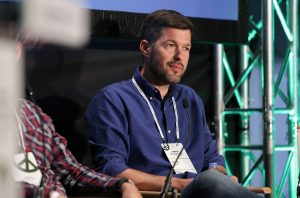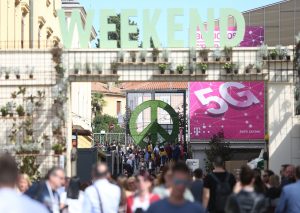„We don’t want to grow more“, says Nikola Vrdoljak, programme director of the Weekend Media Festival in Rovinj, after the recent 12th Weekend Media Festival which had 150 speakers and 5,000 visitors. Is this a sign of a subsided ambition of the festival’s organizer? “Of course not,” says our interlocutor, “we are ambitious and want to become an even more important factor in this region.”

Photo: Matija Habljak/PIXSELL
Just as the visitors started to recap their impressions from the latest Weekend Media Festival in Rovinj, the team behind this fantastically successful project, that changes our understanding of digitization and the media, is focusing on a new challenge – namely, how to further improve creative indolence.
1.You were quoted as saying:“ We are raising the bar every year; without that nothing makes sense’. How did the recent 12th Weekend Media Festival raise the bar?
It is a privilege for me to do this festival every year. Equally, it is also a great challenge. Every year, we want to follow, understand and re-examine everything that has been happening in the world of media, marketing, technology and business. The world we follow is changing rapidly as the media is one of the first industries to be hit by the onslaught of digitization. Therefore, raising the bar every year for me means having increasingly better discussions that follow these changes. They don’t only follow changes but also influence trends in this region. If you look at our programme, you will see that we had fantastic speakers such as the legendary “saviour of the Swiss watch industry” who spoke to us about the industry that survived the first wave of digitization, as well as crucial discussions about today’s media and the convergence of television and telecom. Regarding the latter, Sara Fischer, a top media analyst at US Axios, gave us a global overview. We covered the local situation through a discussion between the regional media and telecoms stakeholders. The growth of the Internet and consequently of streaming has fueled the domino effect of change in several related industries. Telecoms are buying the media which are either consolidating or disappearing, while the cost of content is rising due to the increased demand for large platforms, which, in turn, increases the cost of local content too. The content growth is accompanied by the need to find good locations, which we, in Croatia, as well as the entire region, are following closely. The only thing left to watch live is sports, so its price is soaring. All these changes are changing the power relations in the media, and of course, politics is following closely by. As the media goes through a change of business model, their independence is weakening, and we can’t help but wonder if they are still the guardians of democracy. We analyzed all this in detail at the Weekend Media Festival. Since digitization is everywhere, we also discussed how to live a quality life in the digital age. Ranko Rajović gave a fantastic speech, explaining how to raise children in the digital age. Ranko was greeted with a standing ovation from the audience and brilliantly proved that this is a problem for all of us that we don’t know how to deal with. Every year, our programme is getting more relevant and that’s raising the bar for us. Of course, we need to grow in all segments, so the party, the showroom itself, Rovinj and its hotels are looking better every year, also making the Weekend experience better.
2.As the programme director of a leading festival of this type, do you get more opportunities for cooperation year-on-year, or maybe you get more challenges and have to face stiffer competition?
The competition is getting fiercer every year and many festivals in the region are copying parts of the Weekend which makes us happy because that shows that we are relevant. However, the Weekend opens many doors in this region and by working on this festival, which, of course, lasts throughout the year, we can carefully monitor the processes and changes that are taking place. The mix of global changes and Balkan politics guarantees interesting content.
3.How much are the regional media and creative industry lagging behind the global change?
I would say that the media and creative industries in this region want to change more and faster than the markets themselves are prepared for. We all follow what is happening in the West and we want to be a part of these changes. Unfortunately, the reality is that the average age of a person living in this region is over 42, our purchasing power is low, and therefore our willingness to accept new trends is not that great. Still, we are not giving up and will keep pushing.

4.Modern-day work is becoming increasingly faster and leaves us with less spare time. How important is idleness for creativity and how can we stick to it?
We like to say that creative indolence is the essence of the Weekend Media Festival. On the other hand, I do not like to idolize creativity. I think everyone is creative and we need to work on and develop creative problem-solving. Modern jobs require more creativity because the heavier, physical part is now handled by machines, so we can focus on the creative part.
5.What’s a bigger challenge for you – to put together the list of speakers or to organize the entertainment segment of the festival?
I am in charge of the festival programme, while Tomo Ricov is in charge of the entertainment portion, and it’s exactly this combination that makes the Weekend successful. We are selling the experience. Every visitor wants to come back feeling enriched. Our product is exactly that experience. You can watch a fantastic lecture on YouTube anytime while the number of festivals and concerts is greater than ever. We sell neither of them but rather a total experience where you have fun, learn and enjoy the beautiful scenery of Rovinj. Put all of this together and you get the Weekend.
6.For the past twelve years, the Weekend Media Festival has been following the most intense media changes in history. How much is this region keeping up with them?
I would say better than you would expect given the economic situation of the region. The global media outlet Axios reported about the Weekend as their first news and about this thought-provoking region, where the changing economic basis of the media and the entry of foreign capital into content production is accompanied by an interesting local political story.
7.The last WMF took part in 6 different halls and had 150 speakers and 5,000 visitors. How will keep all of that under control if the number of visitors continues to grow?
We believe that our core target group comprises about 10,000 people from this region. Our goal is to have 5,000 of them every year attend the Weekend and that everyone from that target group must come to the Festival at least once every three years. Therefore, we do not want to grow anymore; we want to improve the visitor experience. We want to become an even more important factor in this region.
8.What are the social consequences of digital change and how does it impact your work?
They are quite big. I believe we still underestimate them all. Digitization has a significant impact on changing the economic base, which, in turn, will continue to have significant political and wider social consequences. To truly join the digital society, we will have to redefine many of the philosophical concepts that underpin the market and society today. We are already seeing examples of that; from the EU’s definition of a monopoly in digital platforms to redefining work which we interpret through the gig economy and flat-rate businesses, as well as through loss of the territorial basis of many concepts of the modern state. An extremely interesting period awaits us.